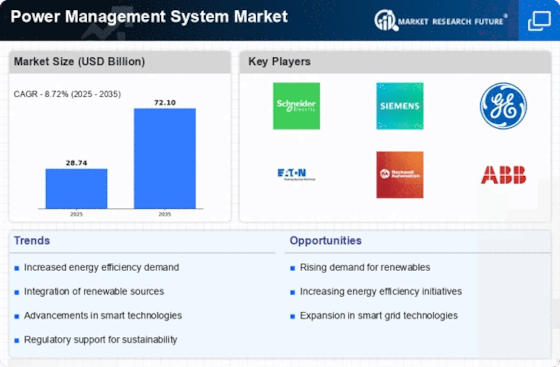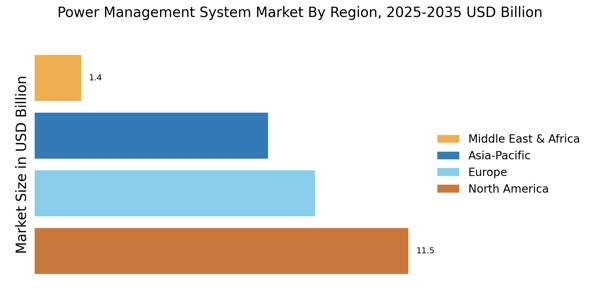Growing Electric Vehicle Adoption
The Power Management System Market Industry is significantly influenced by the growing adoption of electric vehicles (EVs). As the automotive sector transitions towards electrification, the demand for efficient power management systems is expected to rise. EVs require sophisticated power management solutions to optimize battery performance and charging processes. Reports suggest that the EV market is projected to expand rapidly, with millions of units expected to be sold annually in the coming years. This growth necessitates the development of robust power management systems that can handle the complexities associated with EV charging infrastructure. Thus, the increasing prevalence of electric vehicles is likely to serve as a catalyst for the Power Management System Market Industry.
Rising Demand for Energy Efficiency
The Power Management System Market Industry is witnessing a surge in demand for energy-efficient solutions. As energy costs continue to escalate, businesses and consumers alike are prioritizing systems that minimize energy waste. This trend is further supported by various governmental initiatives aimed at promoting energy efficiency. For instance, energy efficiency programs have been implemented in numerous regions, encouraging the adoption of power management systems that optimize energy use. Market data indicates that energy-efficient technologies could reduce energy consumption by up to 30% in certain applications. Consequently, the increasing focus on sustainability and cost savings is likely to propel the growth of the Power Management System Market Industry.
Integration of Advanced Technologies
The Power Management System Market Industry is experiencing a notable shift towards the integration of advanced technologies such as artificial intelligence and machine learning. These technologies enhance the efficiency of power management systems by enabling predictive analytics and real-time monitoring. As organizations increasingly seek to optimize energy consumption, the demand for systems that can intelligently manage power distribution is likely to rise. Reports indicate that the market for AI in energy management is projected to grow significantly, potentially reaching billions in revenue by 2026. This trend suggests that companies investing in advanced power management solutions may gain a competitive edge, thereby driving growth in the Power Management System Market Industry.
Regulatory Frameworks Supporting Clean Energy
The Power Management System Market Industry is benefiting from regulatory frameworks that support the transition to clean energy. Governments worldwide are implementing policies that encourage the adoption of renewable energy and energy-efficient technologies. These regulations often include incentives for businesses to invest in power management systems that align with sustainability objectives. For example, tax credits and grants are frequently offered to organizations that implement energy-efficient solutions. As these regulatory measures become more prevalent, the demand for power management systems that comply with new standards is expected to increase. This regulatory support is likely to play a crucial role in shaping the future of the Power Management System Market Industry.
Increased Focus on Renewable Energy Integration
The Power Management System Market Industry is being propelled by an increased focus on integrating renewable energy sources into existing power grids. As nations strive to meet sustainability goals, the incorporation of solar, wind, and other renewable sources is becoming essential. This transition requires advanced power management systems capable of handling the variability and intermittency associated with renewable energy. Market analysis indicates that investments in renewable energy infrastructure are expected to reach trillions of dollars over the next decade. Consequently, the demand for power management systems that facilitate this integration is likely to grow, thereby driving the Power Management System Market Industry forward.

















